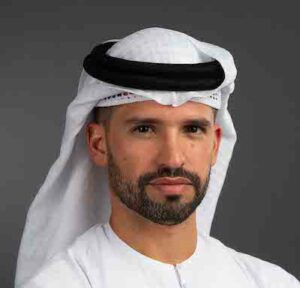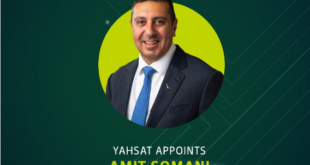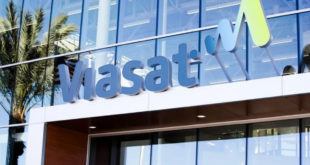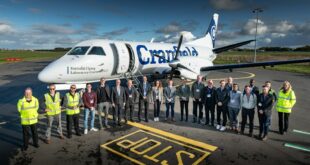By Viktoria Urban

Our Space Café WebTalk “33 minutes with Adnan Al Muhairi – Why Next Gen? – The Thuraya Programme” took place on Tuesday, 31st May 2022.
Adnan Al Muhairi is the Chief Technology Officer of the Al Yah Satellite Communications Company (Yahsat), and has had a distinguished career in the space industry. He was part of a development program in South Korea as a research and development engineer working on the UAE’s first successful remote sensing spacecraft, Dubaisat-1 and Dubaisat-2.
He has also worked on the UAE’s first communication spacecraft, Al Yah 1 and Al Yah 2, and he was the Program Director of the Al Yah 3 space communications system – a highly advanced space network that expanded Yahsat’s services into Brazil.
In 2020, Al Muhairi was featured by the US-based Space and Satellite Professionals International (SSPI) on their prestigious ’20 under 35′ list of most promising space and satellite professionals in the world. He is the first Emirati male space and satellite professional to be handpicked by SSPI for the honour.
Al Muhairi obtained a BSc in Avionics/Engineering Management from the Higher College of Technology. He then completed an intensive course in satellite systems engineering in South Korea, before completing masterclass training in Frequency Coordination at RPC Telecommunications. This was followed by ground station operations and maintenance training at VIASAT in the USA, before he earned an MBA from the Global Executive Program at the McDonough School of Business from Georgetown University in Washington DC.
Al Muhairi explains that Yahsat is a relatively young company, established in 2007. He joined the company in 2018, when it started integrating the teams and services that Yahsat and Thuraya provide. Together they hover over 150 countries providing services in L-band and C-band. With their five satellites, they are able to serve any solution that the customers desire from low data rate secure communications to very high throughput communications.
He says that the communication services that Yahsat provides to the UAE are essential, one of the most important aspects of the capabilities of any nation. The company participates in development, works with academia, and has a master’s degree program as well.
“The growth of capabilities, the growth of knowledge within the economy and the country is very important for the next generation of students of engineers, and we believe in that strongly,” he states.
Yahsat provides its customers and partners the best service possible with continuous improvement. Al Muhairi claims that the demand is there, the customers need improved flexibility, higher throughput and security, which the company provides through its next generation of satellites. The next gen system is a transformation of the complete network, an MSS mobile satellite system. Yahsat currently has a satellite under manufacture at Airbus with nearly three times the capacity than that of the previous system. The security features have been increased significantly, as well as the flexibility and the performance.
The company is focused on geostationary Earth orbit (GEO) mainly, but it is also exploring ideas in low Earth orbit (LEO).
“Ultimately, in terms of providing the best service to the customers, the combination of LEO and GEO systems is going to give all the solution that customers need. So I do see a future of all these systems working at the same time providing those services to customers,” he states.
Al Muhairi says that Yahsat serves up to Northern Europe and down to the South African borders. However, the next gen system will completely cover the entire African continent.
He explains that sustainability is very important to the company and for the UAE as a whole. Yahsat therefore has integrated guidance into its policies to ensure that the firm is doing all it can to ensure it meets the goals both in space and on the ground. For example, the firm does not leave space debris behind but de-orbits its satellites adhering to international standards.
His vision for the next decade for the sat comms community is standardization:
“We need to move towards standards, meaning a lot of compatibility between different products, different systems, different satellite networks, because I believe that will create more value for the entire business,” he says.
To listen to the Space Café WebTalk’s insights, you can watch the full program here:
Viktoria Urban, contributing Editor at SpaceWatch.Global: After graduating as a Journalist from Edinburgh Napier University, I am now doing an Astronomy and Planetary Science degree at The Open University (Scotland) which has enhanced my already existing love and enthusiasm for space. I am also a member of and a volunteer for several societies both in Hungary and in the UK and write online content on space for multiple companies as well. I hope my science communication will encourage many to find a job in the space sector, whatever their background and highlight important issues to ensure a sustainable space environment for future generations.
 SpaceWatch.Global An independent perspective on space
SpaceWatch.Global An independent perspective on space




